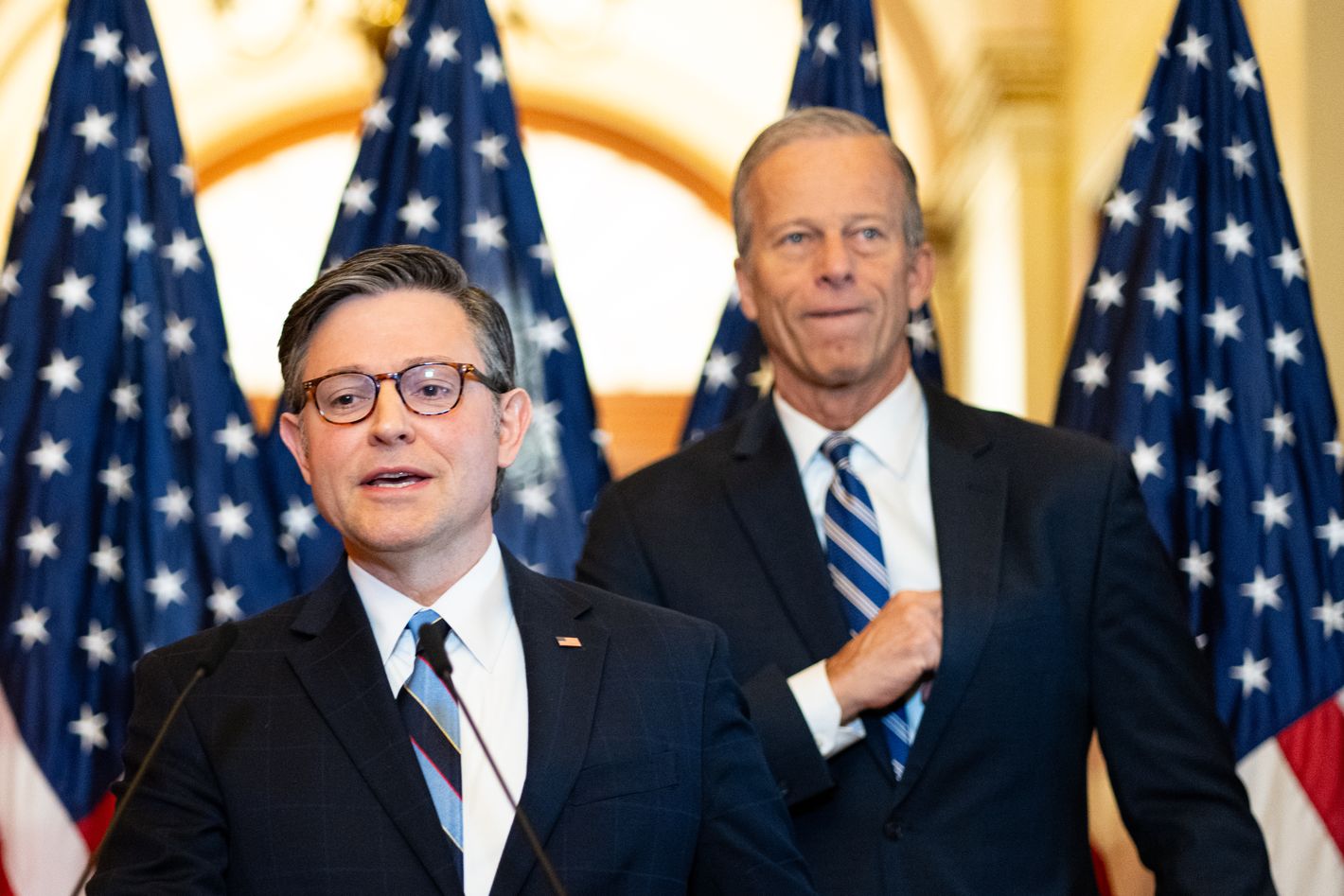Photo: Bill Clark/CQ-Roll Call/Getty Images
Tariffs aside, the big story in Washington this week has been the latest stage in the struggle of House and Senate Republicans to get on the same page in moving toward enactment of Donald Trump’s legislative agenda via a monstrously large budget-reconciliation bill. They got stuck in the very first stage of the process necessary to enact Trump’s “one big, beautiful bill”: a joint congressional budget resolution laying out a basic outline of spending and revenue measures covering the next ten years. This resolution will authorize the next stage, the reconciliation bill itself.
But now they’re finally unstuck, at least for now, as the House narrowly approved a Senate-passed resolution on Thursday.
To go back a bit: After the House and the Senate passed wildly varying budget resolutions that didn’t even agree on the number of reconciliation bills, Trump intervened to endorse the one-bill approach. The Senate moved first with an exceptionally controversial resolution that (a) pretended nearly $4 trillion in tax cuts would have no impact on budget deficits and (b) went extremely light on required budget cuts to pay for these allegedly minimal revenue losses. Trump and Speaker Mike Johnson then told House Republicans to swallow hard and buy the Senate resolution, while instructing House committees to come up with at least a trillion and a half in domestic spending cuts, with the large and popular Medicaid program being the big target. It was a weird sort of agree-to-disagree arrangement likely based on Trump’s total lack of interest in budget details, other than getting the tax cuts he needs to reward business folk unhappy with his tariff agenda and the wild antics of Elon Musk. So the proposed bill essentially kicked the can down the road on all the tough decisions.
But when push came to shove, Johnson and Trump (who did some personal arm-twisting) could not convince the “fiscal hawks” of the House Freedom Caucus to go along with the Senate resolution and had to call off a vote scheduled for Wednesday night. First thing Thursday morning, Johnson and Senate Republican leader John Thune held a brief presser in which the latter announced he was committed to achieving at least $1.5 trillion in unspecified spending cuts and the former confidently predicted this assurance would be enough to get the House fiscal hawks onboard. He was right, as the Senate budget resolution passed the House without a vote to spare (as expected, every Democrat voted “no”).
Basically, then, Senate Republicans learned this morning that their leader has committed them to what will almost certainly be major Medicaid cuts. No, they probably won’t admit that’s what it means, but the budget math simply doesn’t work any other way. So Republicans will be playing right into the chief Democratic message that Trump’s agenda amounts to slashing Medicaid and other popular benefit programs in order to finance a totally unnecessary tax cut for the rich. It’s also possible that House hard-liners will insist on more concrete Senate commitments to specific cuts, perhaps even to Medicaid cuts by name, even before the reconciliation bill is drafted.
So other than the ancient mistrust that underlies House-Senate communications, what’s going on in this struggle over how specific to get on the ultimate content of Trump’s “big, beautiful bill?” For the House Freedom Caucus types, it’s pretty simple: 2025 is the great gettin’ up morning for a project they and their predecessors have nourished since the 1960s: rolling back key elements of the welfare state, of which the Great Society’s Medicaid program is the largest and most politically vulnerable (in the sense of not being totally bulletproof the way Social Security and Medicare have become). They not only want guaranteed domestic spending cuts; they want their own and their party’s fingerprints all over the weapon that wounds the big government beast. If not now, they wonder, when will it ever happen? Yes, they care about budget deficits and public debt, at least more than Trump does, which is one reason they are driving a hard bargain on a budget resolution that includes a major boost in the national debt limit. But in the end it’s about budget cuts as an end in itself.
There are some Senate Republicans who share these obsessions, and they undoubtedly helped convince Thune to issue his handshake agreement with Johnson on budget cuts. Others really just want the tax-cut pot of gold at the end of the process and will do as little or as much as is necessary to get there. We’ll see in the end if they have the political appetite to vote for a reconciliation bill that satisfies both major Republican factions.

